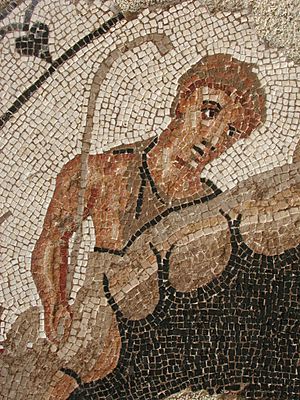Font de Mussa Mosaic facts for kids
Quick facts for kids Mosaic de la Font de Mussa |
|
|---|---|

Detail of the Mosaic, with Faustulus represented.
|
|
| Artist | Unknown |
| Year | approx. 1st-2nd century Discovered in 2001 in Font de Mussa (Benifaió) |
| Type | Mosaic |
| Medium | Marble |
| Dimensions | 550 cm × 425 cm (220 in × 167 in) |
| Location | Prehistory Museum of Valencia, Valencia |
The Mosaic de Font de Mussa (which means Mosaic from the Source of Mussa in English) is an amazing ancient mosaic from the Roman Empire. It was found in a place called Benifaió in Spain. This mosaic is very old, made around the 1st or 2nd century AD. Today, you can see this special artwork at the Prehistory Museum of Valencia in Valencia. It's one of the most important pieces there!
What is a Mosaic?
A mosaic is a picture or pattern made from many small pieces. These pieces are often made of colored stone, glass, or other materials. They are carefully placed together to create a larger image.
The Mosaic de Font de Mussa is a type of Roman mosaic called opus tessellatum. This means it was made using small, square pieces. These tiny pieces are called tesserae. For this mosaic, the tesserae are made of marble and are only about 6 millimeters (0.24 inches) big.
The Story in the Mosaic
The main part of the mosaic shows a colorful picture. It tells a famous story from ancient Roman myths. The picture shows two figures:
- The shepherd Faustulus
- Faustulus's brother
They are standing in front of a cave. Inside the cave, you can see a wolf. This wolf is important because she is said to have nursed two famous babies: Romulus and Remus.
Romulus and Remus are the legendary founders of the city of Rome. The story says they were abandoned as babies. A she-wolf found them and cared for them. Later, a shepherd named Faustulus discovered them and raised them as his own sons. This mosaic captures a moment from this famous legend.
See also
 In Spanish: Mosaico de Font de Mussa para niños
In Spanish: Mosaico de Font de Mussa para niños

